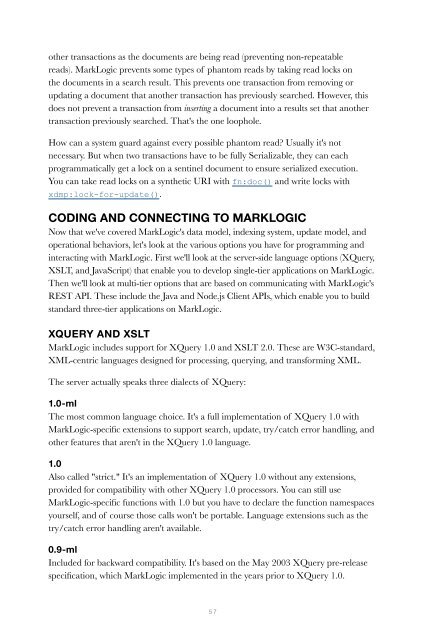Create successful ePaper yourself
Turn your PDF publications into a flip-book with our unique Google optimized e-Paper software.
other transactions as the documents are being read (preventing non-repeatable<br />
reads). MarkLogic prevents some types of phantom reads by taking read locks on<br />
the documents in a search result. This prevents one transaction from removing or<br />
updating a document that another transaction has previously searched. However, this<br />
does not prevent a transaction from inserting a document into a results set that another<br />
transaction previously searched. That's the one loophole.<br />
How can a system guard against every possible phantom read? Usually it's not<br />
necessary. But when two transactions have to be fully Serializable, they can each<br />
programmatically get a lock on a sentinel document to ensure serialized execution.<br />
You can take read locks on a synthetic URI with fn:doc() and write locks with<br />
xdmp:lock-for-update().<br />
CODING AND CONNECTING TO <strong>MARKLOGIC</strong><br />
Now that we've covered MarkLogic's data model, indexing system, update model, and<br />
operational behaviors, let's look at the various options you have for programming and<br />
interacting with MarkLogic. First we'll look at the server-side language options (XQuery,<br />
XSLT, and JavaScript) that enable you to develop single-tier applications on MarkLogic.<br />
Then we'll look at multi-tier options that are based on communicating with MarkLogic's<br />
REST API. These include the Java and Node.js Client APIs, which enable you to build<br />
standard three-tier applications on MarkLogic.<br />
XQUERY AND XSLT<br />
MarkLogic includes support for XQuery 1.0 and XSLT 2.0. These are W3C-standard,<br />
XML-centric languages designed for processing, querying, and transforming XML.<br />
The server actually speaks three dialects of XQuery:<br />
1.0-ml<br />
The most common language choice. It's a full implementation of XQuery 1.0 with<br />
MarkLogic-specific extensions to support search, update, try/catch error handling, and<br />
other features that aren't in the XQuery 1.0 language.<br />
1.0<br />
Also called "strict." It's an implementation of XQuery 1.0 without any extensions,<br />
provided for compatibility with other XQuery 1.0 processors. You can still use<br />
MarkLogic-specific functions with 1.0 but you have to declare the function namespaces<br />
yourself, and of course those calls won't be portable. Language extensions such as the<br />
try/catch error handling aren't available.<br />
0.9-ml<br />
Included for backward compatibility. It's based on the May 2003 XQuery pre-release<br />
specification, which MarkLogic implemented in the years prior to XQuery 1.0.<br />
57


